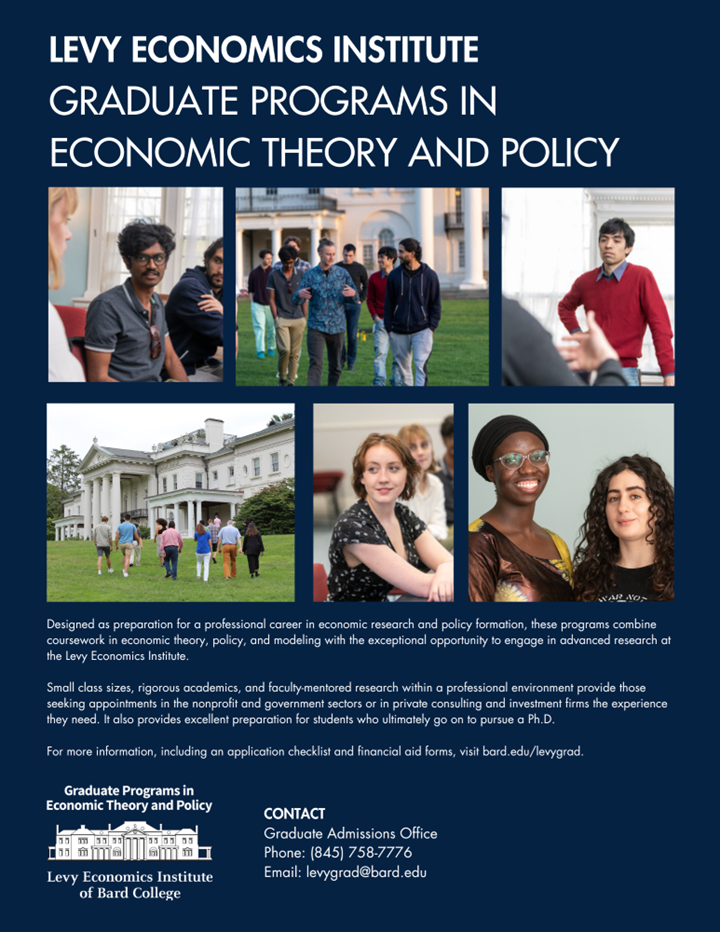CONTENTS
- Letter from the President
- Conference Schedule
- Speaker Biographies
- Parking and Map
- Levy Graduate Program Information
- Accommodations and Travel
LETTER FROM THE PRESIDENT
Dear Colleagues and Friends,
Welcome to the 32nd Annual Conference of the Levy Economics Institute—our first in-person gathering since the pandemic, convening at a moment of extraordinary economic upheaval. The challenges before us are among the most consequential in a century: a global trade order in disarray, deepening economic insecurity for working families, a financial sector growing more complex and opaque, and the urgent need for climate finance and new development paradigms.
We are navigating yet another phase of global economic turmoil—one that demands the bold, innovative thinking the Levy Institute has championed for decades.
The Levy Impact
Our research on financial instability became the definitive analysis during and after the Global Financial Crisis. More recently, our work on modern money and public finance reshaped debates around the necessary—and unprecedented—fiscal responses to the COVID crisis. Our job guarantee proposal has influenced global policy discussions, offering a viable alternative to means-tested welfare and punitive “workfare” systems.
Despite the post-COVID rebound, deep structural fissures in the American economy persist, fueling voter discontent and reshaping political landscapes. Against this backdrop, this year’s conference examines four critical themes:
- The evolution—and vulnerabilities—of the financial sector since the Global Financial Crisis, including climate finance and emergent risks through a Minskyan lens;
- The promise and limits of crisis response tools, assessing fiscal/monetary policy effectiveness and the resurgence of “pay-for” myths;
- The crisis of working America, linking economic grievances to political outcomes; and
- The global economic reordering, from trade realignments to alternative development models.
Financial Instability and Threats to US Monetary Sovereignty
Since the GFC, markets have grown more opaque, more unwieldy, and more fragile—as the Silicon Valley Bank collapse and bond market turmoil earlier this year demonstrated. Meanwhile, the Trump administration’s policies are undermining confidence in dollar-denominated assets, fueling doubts about whether Washington remains willing—or even able—to orchestrate the kind of coordinated crisis response that only the United States can provide, and that global markets have come to depend on. Meanwhile, the deliberate dismantling of the administrative state—a Made-in-America self-inflicted crisis—has left the country dangerously unprepared. Hollowed-out agencies lack the capacity to enforce regulations, respond to economic shocks, or even reliably process citizens’ basic needs. This isn’t efficiency; it’s unilateral disarmament in the face of complex global challenges.
For the first time in decades, the payments system itself is under threat. A self-sabotage of dollar hegemony could crack the foundations of US monetary sovereignty—with global consequences.
Working Families: The Crisis No One Is Solving
Decades of neoliberalism have left working families—in the US and abroad—with eroding incomes, vanishing stability, and broken promises. This year, alongside our flagship research on financialization and public money, we confront the economic consequences of Trumpism, the bipartisan abandonment of the working class, and the political fallout.
At this pivotal moment, we ask: What is economic policy for? What do working families truly need? And how do we deliver the security they demand?
Trade Wars and False Solutions
Trump’s trade policies have shattered alliances and accelerated the death of the 1990s free trade model—and good riddance. This neoliberal vision, beloved by elites but few others, brought financialization and deindustrialization in equal measure. But tariffs alone won’t undo decades of neoliberal damage. Working families need good jobs, not the rising prices tariffs will bring. Meanwhile, as the Levy Institute’s stock-flow consistent research shows, the real harbingers of recession are the proposed cuts to discretionary spending, not tariffs per se.
Turning Chaos into Clarity
In The End of Laissez-Faire, Keynes once observed, “Many of the greatest economic evils of our time are the fruits of risk, uncertainty, and ignorance.”
At the Levy Institute, we believe economics must serve the public good and work in harmony with the natural systems that sustain life. Policy cannot be passive or supplementary—it must actively prevent and restrain the chaos of unfettered markets and the environmental and human costs it brings. Yet mainstream theories have too often been instrumental in generating the crises we must now solve. By prioritizing capital over people, austerity over wellbeing, and market dogma over democratic accountability, they have undermined economic security and stability.
This conference is an invitation to all participants and the larger community to cut through the chaos, confront broken orthodoxies, and advance policies that deliver a just, sustainable economy.
Welcome—let’s get to work.
Sincerely,

Pavlina R. Tcherneva
President
CONFERENCE SCHEDULE
| 8:15–8:45 a.m. EST | Registration (Olin Hall) |
| 8:45–9:00 a.m. |
Welcome & Introduction Pavlina R. Tcherneva | Levy Economics Institute |
| 9:00–10:30 a.m. | SESSION I | BEYOND MINSKY MOMENTS |
| MODERATOR: Talmon Joseph Smith | The New York Times | |
|
SPEAKERS: Daniel Alpert| Westwood Capital
Leila Davis | University of Massachusetts Boston
Rogerio Studart | Brazilian Center for International Relations
|
|
| 10:30–10:45 a.m. | Coffee Break |
| 10:45–12:15 p.m. | SESSION II | ECONOMIC POLICY IN THE AGE OF TRUMP |
| MODERATOR: Ryan Cooper | The American Prospect | |
|
SPEAKERS: Pavlina R. Tcherneva | Levy Economics Institute
James K. Galbraith | LBJ School of Public Affairs; Levy Economics Institute
L. Randall Wray | Levy Economics Institute
|
|
| 12:15–2:00 p.m. | Lunch at Kline Commons |
| 2:15–3:30 p.m. |
KEYNOTE ADDRESS | Representative Ro Khanna (CA-17) MODERATOR: Alan Minsky | Progressive Democrats of America |
| 3:30–3:45 p.m. | Coffee Break |
| 3:45–5:15 p.m. | SESSION III | US POLICY AND THE GLOBAL ECONOMY |
| MODERATOR: Edward Harrison | Bloomberg | |
|
SPEAKERS: Giuliano T. Yajima | Levy Economics Institute
Yan Liang | Willamette University
Ndongo Samba Sylla | International Development Economics Associates (IDEAs-Africa)
Fadhel Kaboub | Denison University
|
|
| 5:30–6:00 p.m. | Reception on the Blithewood Lawn |
| 6:00–8:00 p.m. | Dinner |
THE FULL SCHEDULE IS AVAILABLE IN PDF HERE
PARKING AND MAP
Olin Hall
35 Henderson Cir Drive
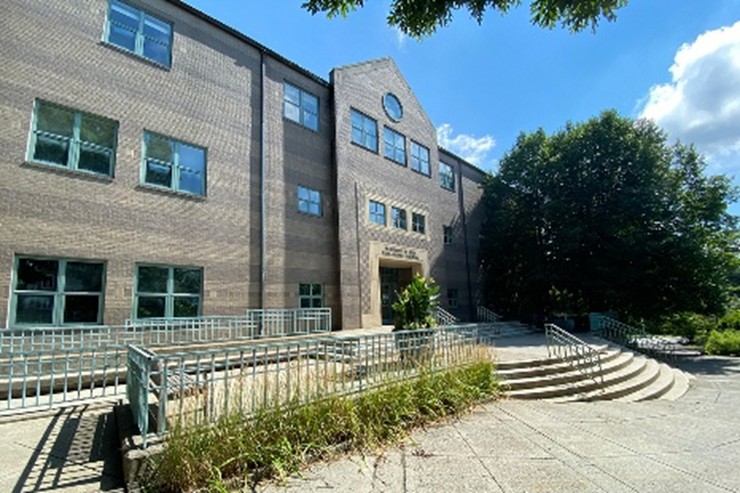 The conference takes place in Olin Hall, on the Bard College campus in Annandale-on-Hudson, NY–which is roughly a two-hour drive/train ride from the major New York City airports–indicated in green on the map below, . Parking is available nearby, marked in blue on the map below.
The conference takes place in Olin Hall, on the Bard College campus in Annandale-on-Hudson, NY–which is roughly a two-hour drive/train ride from the major New York City airports–indicated in green on the map below, . Parking is available nearby, marked in blue on the map below.
Lunch & Dinner
For both meals, please bring your lanyards and/or ID badges for entry.
Lunch will be cafeteria-style at Kline Commons (yellow), a two-minute walk from Olin. The food is to your left when you enter Kline (please show your lanyard to the Kline staff); our seating area is to the right (there will be a sign indicating “Levy Institute Conference”).
Dinner will be under a tent outside of Blithewood (red), the Levy Economics Institute’s headquarters. Blithewood is a 15-minute walk from Olin Hall. There will also be shuttles to take you to Blithewood, which will be waiting on Campus Road by Olin Hall (to your left as you exit the Olin building).
Click here for access to a digital map of campus.
SPEAKER BIOGRAPHIES
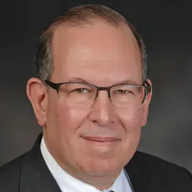 Daniel Alpert is Founding Managing Partner of Westwood Capital, LLC and its affiliates. He established the New York-based investment banking firm in 1995 after a career at Oppenheimer & Co., Inc. where he headed the real estate investment banking group. Prior to Oppenheimer, Alpert was active in commercial real estate finance and syndication in the 1980s. In addition to his role at Westwood, Alpert is an adjunct professor and senior fellow at Cornell Law School where he is a researcher and author on macroeconomics and finance. He is a co-creator of the United States Private Sector Job Quality Index, an economic metric that measures higher wage versus lower wage private sector jobs (currently administered by the University of Buffalo, where Alpert is also a member of the adjunct faculty), and the author of The Age of Oversupply: Confronting the Greatest Challenge to the Global Economy as well as numerous white papers. Among many other organizational affiliations, Alpert is an adviser to the Coalition for a Prosperous America and a founder of the World Economic Roundtable program. Prior to joining Cornell, Alpert was a fellow at The Century Foundation in New York.
Daniel Alpert is Founding Managing Partner of Westwood Capital, LLC and its affiliates. He established the New York-based investment banking firm in 1995 after a career at Oppenheimer & Co., Inc. where he headed the real estate investment banking group. Prior to Oppenheimer, Alpert was active in commercial real estate finance and syndication in the 1980s. In addition to his role at Westwood, Alpert is an adjunct professor and senior fellow at Cornell Law School where he is a researcher and author on macroeconomics and finance. He is a co-creator of the United States Private Sector Job Quality Index, an economic metric that measures higher wage versus lower wage private sector jobs (currently administered by the University of Buffalo, where Alpert is also a member of the adjunct faculty), and the author of The Age of Oversupply: Confronting the Greatest Challenge to the Global Economy as well as numerous white papers. Among many other organizational affiliations, Alpert is an adviser to the Coalition for a Prosperous America and a founder of the World Economic Roundtable program. Prior to joining Cornell, Alpert was a fellow at The Century Foundation in New York.
Alpert’s investment banking expertise focuses on structured finance across asset classes and international regions. Beginning in 1990, he was the creator of the first several investment-grade rated Commercial Mortgage Back Securities (CMBS) transactions ever issued, led the first multifamily REIT equity offering, and developed numerous primary bond and CLO structures for financial, real, and operating assets across multiple sectors. Alpert expanded Westwood’s business into Pacific Asia, beginning in 2000 and was responsible for Westwood’s expansion into Latin America via the hiring of Citibank’s Latin American specialty structured finance group in 2009. He is also an expert in bankruptcy and restructuring, having represented creditors committees of companies involved in securitized debt transactions, as well as several branches of the U.S. government seeking recoveries connected with the 2008–10 Global Financial Crisis.
Alpert holds a degree in Public Policy from the University of Pennsylvania. He has six children and step-children, and lives in New York and Florida with his wife, Sally King.
 Ryan Cooper is a senior editor at The American Prospect, and author of How Are You Going to Pay for That?: Smart Answers to the Dumbest Question in Politics.
Ryan Cooper is a senior editor at The American Prospect, and author of How Are You Going to Pay for That?: Smart Answers to the Dumbest Question in Politics.
 Leila Davis is an Associate Professor in the Economics Department at the University of Massachusetts Boston. Her research focuses on financialization, profitability, and financial fragility of U.S. firms, as well as on the intersection of financialization and the economic outcomes of the U.S. working class. She received her PhD in Economics from the University of Massachusetts Amherst and her bachelor’s degree from the University of Wisconsin. She is an Associate Editor at the Review of Social Economy and Journal of Post Keynesian Economics.
Leila Davis is an Associate Professor in the Economics Department at the University of Massachusetts Boston. Her research focuses on financialization, profitability, and financial fragility of U.S. firms, as well as on the intersection of financialization and the economic outcomes of the U.S. working class. She received her PhD in Economics from the University of Massachusetts Amherst and her bachelor’s degree from the University of Wisconsin. She is an Associate Editor at the Review of Social Economy and Journal of Post Keynesian Economics.
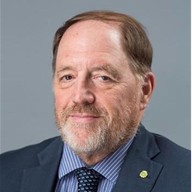 Senior Scholar James K. Galbraith holds the Lloyd M. Bentsen Jr. Chair in Government/Business at the Lyndon B. Johnson School of Public Affairs, The University of Texas at Austin. He chairs the board of Economists for Peace and Security and directs the University of Texas Inequality Project. He was executive director of the Joint Economic Committee in the early 1980s. From 1993 to 1997, he served as chief technical adviser to China’s State Planning Commission for macroeconomic reform, and, in the first half of 2015, as an informal counselor to the Greek minister of finance.
Senior Scholar James K. Galbraith holds the Lloyd M. Bentsen Jr. Chair in Government/Business at the Lyndon B. Johnson School of Public Affairs, The University of Texas at Austin. He chairs the board of Economists for Peace and Security and directs the University of Texas Inequality Project. He was executive director of the Joint Economic Committee in the early 1980s. From 1993 to 1997, he served as chief technical adviser to China’s State Planning Commission for macroeconomic reform, and, in the first half of 2015, as an informal counselor to the Greek minister of finance.
Galbraith studied economics as a Marshall Scholar at King’s College, Cambridge, and holds degrees from Harvard University (BA) and Yale University (Ph.D.). In 2010, he was elected to the Accademia Nazionale dei Lincei, the oldest honorific scientific academy in the world. In 2014, Galbraith was a co-winner with Angus Deaton of the Leontief Prize for Advancing the Frontiers of Economics, and in 2020, he was a winner of the Veblen-Commons Award. In 2022 he was elected to the Russian Academy of Sciences and in 2023 to the Lisbon Academy of Sciences. He is presently serving pro bono as Chair of the Palau Economic Advisory Group, a bilateral committee constituted in 2022 under the Compact of Free Association between the United States and the Republic of Palau.
 Edward Harrison is a senior Editor at Bloomberg. He is also the founder of Credit Writedowns newsletter, a former career diplomat, investment banker, and technology executive with over twenty-five years of business experience. He speaks six languages and reads another five, skills he uses to provide a more global perspective. Edward holds an MBA in Finance from Columbia University and a BA in Economics from Dartmouth College.
Edward Harrison is a senior Editor at Bloomberg. He is also the founder of Credit Writedowns newsletter, a former career diplomat, investment banker, and technology executive with over twenty-five years of business experience. He speaks six languages and reads another five, skills he uses to provide a more global perspective. Edward holds an MBA in Finance from Columbia University and a BA in Economics from Dartmouth College.
 Fadhel Kaboub is an associate professor of economics at Denison University, and the president of the Global Institute for Sustainable Prosperity. He is the author of Global South Perspectives on Substack. He is a member of the United Nations High-Level Advisory Board on Economic and Social Affairs at UN-DESA. He is also a member of the Independent Expert Group on Just Transition and Development, an expert group member with the Global Solidarity Levies Task Force, a member of the Earth4All 21st Century Transformational Economics Commission, a Steering Committee member with the Fossil Fuel Non-Proliferation Treaty Initiative, and a member of the Independent Expert Group on Just Transition Finance. He has recently served as Under-Secretary-General for Financing for Development at the Organisation of Southern Cooperation in Addis Ababa, Ethiopia. Dr. Kaboub is an expert on designing public policies to enhance monetary and economic sovereignty in the Global South, build resilience, and promote equitable and sustainable prosperity. His recent work focuses on Just Transition, Climate Finance, and transforming the global trade, finance, and investment architecture. His most recent co-authored publication is Just Transition: A Climate, Energy, and Development Vision for Africa (May 2023). He has held a number of research affiliations with the Levy Economics Institute (NY), the John F. Kennedy School of Government at Harvard University (MA), the Economic Research Forum (Cairo), Power Shift Africa (Nairobi), African Forum on Climate Change, Energy and Development (Abuja), and the Center for Strategic Studies on the Maghreb (Tunis).
Fadhel Kaboub is an associate professor of economics at Denison University, and the president of the Global Institute for Sustainable Prosperity. He is the author of Global South Perspectives on Substack. He is a member of the United Nations High-Level Advisory Board on Economic and Social Affairs at UN-DESA. He is also a member of the Independent Expert Group on Just Transition and Development, an expert group member with the Global Solidarity Levies Task Force, a member of the Earth4All 21st Century Transformational Economics Commission, a Steering Committee member with the Fossil Fuel Non-Proliferation Treaty Initiative, and a member of the Independent Expert Group on Just Transition Finance. He has recently served as Under-Secretary-General for Financing for Development at the Organisation of Southern Cooperation in Addis Ababa, Ethiopia. Dr. Kaboub is an expert on designing public policies to enhance monetary and economic sovereignty in the Global South, build resilience, and promote equitable and sustainable prosperity. His recent work focuses on Just Transition, Climate Finance, and transforming the global trade, finance, and investment architecture. His most recent co-authored publication is Just Transition: A Climate, Energy, and Development Vision for Africa (May 2023). He has held a number of research affiliations with the Levy Economics Institute (NY), the John F. Kennedy School of Government at Harvard University (MA), the Economic Research Forum (Cairo), Power Shift Africa (Nairobi), African Forum on Climate Change, Energy and Development (Abuja), and the Center for Strategic Studies on the Maghreb (Tunis).
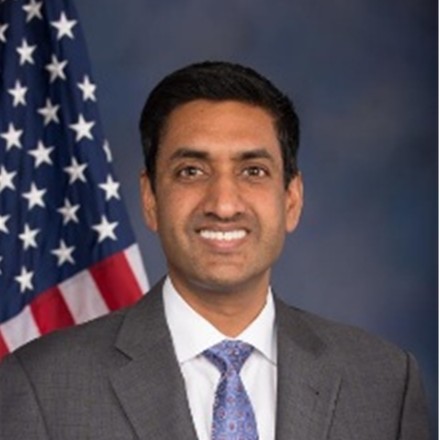 Keynote speaker and fifth-term US House Representative Ro Khanna represents California’s 17th Congressional District, located in the heart of Silicon Valley. He is the vice chair of the Congressional Progressive Caucus, and serves on the House Armed Services Committee as ranking member of the Subcommittee on Cyber, Innovative Technologies and Information Systems (CITI), a member of the Select Committee on the Strategic Competition between the United States and the Chinese Communist Party, and on the Oversight and Accountability Committee, where he previously chaired the Environmental Subcommittee. He also co-chaired Bernie Sanders’ 2020 campaign.
Keynote speaker and fifth-term US House Representative Ro Khanna represents California’s 17th Congressional District, located in the heart of Silicon Valley. He is the vice chair of the Congressional Progressive Caucus, and serves on the House Armed Services Committee as ranking member of the Subcommittee on Cyber, Innovative Technologies and Information Systems (CITI), a member of the Select Committee on the Strategic Competition between the United States and the Chinese Communist Party, and on the Oversight and Accountability Committee, where he previously chaired the Environmental Subcommittee. He also co-chaired Bernie Sanders’ 2020 campaign.
Khanna has worked across the aisle to deliver on legislation to invest in science and technology, create millions of good paying tech jobs and revitalize American manufacturing and production. Khanna authored the Endless Frontier Act, which formed the basis for the sweeping CHIPS and Science Act signed into law by President Biden. Prior to serving in Congress, Khanna taught economics at Stanford University and served as deputy assistant secretary of commerce in the Obama administration. Khanna graduated Phi Beta Kappa with a B.A. in Economics from the University of Chicago and received a law degree from Yale University. Khanna has written two books: Entrepreneurial Nation: Why Manufacturing is Still Key to America’s Future and Dignity in a Digital Age.
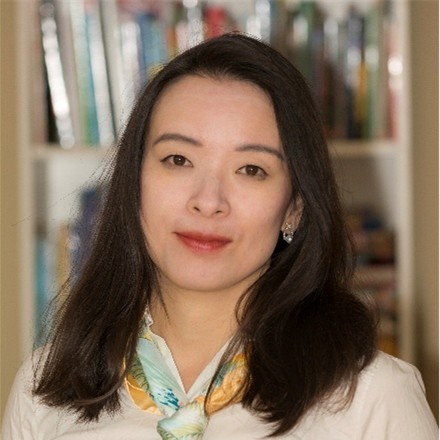 Research Associate Yan Liang is Peter C. and Bonnie S. Kremer Chair Professor of Economics at Willamette University. She is also a Non-Resident Senior Fellow at the Global Development Policy Center (Boston University).
Research Associate Yan Liang is Peter C. and Bonnie S. Kremer Chair Professor of Economics at Willamette University. She is also a Non-Resident Senior Fellow at the Global Development Policy Center (Boston University).
Yan specializes in the Modern Monetary Theory (MMT), the Political Economy of China, Economic Development, and International Economics. Yan’s current research focuses on China’s development finance and industrial transformation, and China’s role in the global financial architecture. Yan publishes in various leading heterodox economics journals and contributes to a number of heterodox economics books. Yan received several grants from the Institute for New Economic Thinking, the Luce Foundation, and the Chinese Ministry of Education. Yan is a regular commentator on the China Global TV Network, CNN International, the East Asia Form, South China Morning Post, the Diplomat Magazine, among others. Yan is an elected board member of the Association for Evolutionary Economics and immediate past president of Association for Institutional Thought. She currently serves as a guest editor for the Chinese Economy.
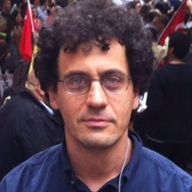 Alan Minsky is a lifelong activist, who has worked as a progressive journalist for the past two decades. Alan was the Program Director at KPFK Los Angeles from 2009-2018; and has coordinated Pacifica Radio’s national coverage of elections. Before that, Alan was one of the founders of LA Indymedia. He is the creator and producer of the political podcasts for The Nation and Jacobin Magazine, as well as a contributor to Commondreams and Truthdig.
Alan Minsky is a lifelong activist, who has worked as a progressive journalist for the past two decades. Alan was the Program Director at KPFK Los Angeles from 2009-2018; and has coordinated Pacifica Radio’s national coverage of elections. Before that, Alan was one of the founders of LA Indymedia. He is the creator and producer of the political podcasts for The Nation and Jacobin Magazine, as well as a contributor to Commondreams and Truthdig.
Alan’s activism began in college with union solidarity work and opposition to US involvement in Central America. In the 1990s and early 2000s, Alan was active in the counter-globalization and media democracy movements. In 2011, he began organizing for Occupy Wall Street in the months leading up to the occupation of Zuccotti Park.
Alan is a committed anti-racist and feminist. He is also an advocate for economic policies that address social inequality, eradicate poverty, and prioritize the interests of working and middle-class households. Alan began working with Progressive Democrats of America in 2014.
 Talmon Joseph Smith is an economics reporter for the Business section of The New York Times, covering nationwide macroeconomic developments, labor and financial markets. He is the author of the forthcoming book from Simon & Schuster, Clout & Capital.
Talmon Joseph Smith is an economics reporter for the Business section of The New York Times, covering nationwide macroeconomic developments, labor and financial markets. He is the author of the forthcoming book from Simon & Schuster, Clout & Capital.
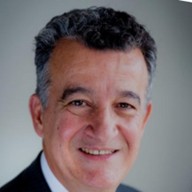 Rogèrio Studart is an internationally renowned economist and development finance expert and former executive director and alternate director at the World Bank (2007-2014) and the Inter-American Development Bank (2003-2007).
Rogèrio Studart is an internationally renowned economist and development finance expert and former executive director and alternate director at the World Bank (2007-2014) and the Inter-American Development Bank (2003-2007).
He is a Senior Visiting Fellow at the Frederick S. Pardee School of Global Studies at Boston University for 2016, a Nonresident Senior Fellow at the Brookings Institution, and a professor at the Institute of Economics of the Federal University of Rio de Janeiro, Brazil (IE-UFRJ). Representing his native Brazil, he has served as the Executive and Alternate Director to the World Bank Group. He is also the former Executive Director at the Inter-American Development Bank (IADB) and the Inter-American Investment Corporation (IIC).
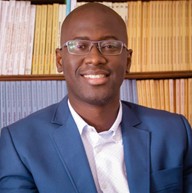 Ndongo Samba Sylla (PhD) is a Senegalese Development Economist. He is currently the Africa Regional Director of the International Development Economics Associates (IDEAs), an organization that brings together economists from the Global South. Previously, he held the position of Advisor to the President of the Republic of Senegal. He is the author and editor of over twenty books published in many languages. His work covers topics such as fair trade, labor markets, democracy, money, and finance. Dr. Sylla is one of the initiators of the Conference on African Monetary and Economic Sovereignty, the third edition of which was held in October 2024 at the African Union. He tweets at @nssylla.
Ndongo Samba Sylla (PhD) is a Senegalese Development Economist. He is currently the Africa Regional Director of the International Development Economics Associates (IDEAs), an organization that brings together economists from the Global South. Previously, he held the position of Advisor to the President of the Republic of Senegal. He is the author and editor of over twenty books published in many languages. His work covers topics such as fair trade, labor markets, democracy, money, and finance. Dr. Sylla is one of the initiators of the Conference on African Monetary and Economic Sovereignty, the third edition of which was held in October 2024 at the African Union. He tweets at @nssylla.
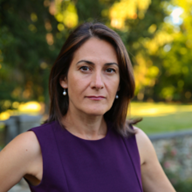 Institute President Pavlina R. Tcherneva is a professor of economics at Bard College and founding director of the Bard Economic Democracy Initiative. She specializes in modern money and public policy. Tcherneva’s book The Case for a Job Guarantee (Polity 2020) is a timely guide to the benefits of one of the most transformative public policies being discussed today, recognized by the Financial Times in 2020 and published in nine languages. Her early work assessed Argentina’s adoption of a similar large-scale job creation proposal she had developed with colleagues in the United States. Tcherneva has collaborated with experts from the United Nations Human Rights Council, the International Labor Organization, members of the European Parliament, as well as policy makers from the United States and abroad on designing and evaluating employment programs. She also worked with the Sanders 2016 Presidential campaign after her research on inequality had garnered national attention. In 2020, she was invited to serve on the Biden-Harris economic policy volunteer committee, during their Presidential run.
Institute President Pavlina R. Tcherneva is a professor of economics at Bard College and founding director of the Bard Economic Democracy Initiative. She specializes in modern money and public policy. Tcherneva’s book The Case for a Job Guarantee (Polity 2020) is a timely guide to the benefits of one of the most transformative public policies being discussed today, recognized by the Financial Times in 2020 and published in nine languages. Her early work assessed Argentina’s adoption of a similar large-scale job creation proposal she had developed with colleagues in the United States. Tcherneva has collaborated with experts from the United Nations Human Rights Council, the International Labor Organization, members of the European Parliament, as well as policy makers from the United States and abroad on designing and evaluating employment programs. She also worked with the Sanders 2016 Presidential campaign after her research on inequality had garnered national attention. In 2020, she was invited to serve on the Biden-Harris economic policy volunteer committee, during their Presidential run.
Her areas of research include monetary and fiscal policy coordination, the Bernanke doctrine, and policy responses during the 2008 and 2020 COVID-induced economic crises. She is the coeditor of Full Employment and Price Stability: The Macroeconomic Vision of William S. Vickrey (Edward Elgar 2004), a rare collection of writings on employment and inflation by the Nobel Prize–winning economist, adapted for the modern day. In 2006, she was a visiting scholar at the University of Cambridge, U.K., where she immersed herself in J.M. Keynes’s collected writings. She developed an interpretation of Keynes’s policy approach to full employment for which she was recognized by the Association for Social Economics with the Helen Potter Prize (2012).
 Senior Scholar L. Randall Wray is a Professor of Economics at the Levy Economics Institute of Bard College and Emeritus Professor at University of Missouri-Kansas City. He is one of the developers of Modern Money Theory and his newest book on the topic is Understanding Modern Money Theory: Money and Credit in Capitalist Economies (Elgar).
Senior Scholar L. Randall Wray is a Professor of Economics at the Levy Economics Institute of Bard College and Emeritus Professor at University of Missouri-Kansas City. He is one of the developers of Modern Money Theory and his newest book on the topic is Understanding Modern Money Theory: Money and Credit in Capitalist Economies (Elgar).
Recent books include: A Great Leap Forward: Heterodox Economic Policy for the 21st Century; Academic Press; 2020; Making Money Work for Us (Polity, November 2022), a companion illustrated guide, Money For Beginners (Polity, May 2023, with Levy Institute graduate Heske Van Doornen), and the third edition of Modern Money Theory: A Primer on Macroeconomics for Sovereign Monetary Systems (Springer, 2024). He is also the author of Why Minsky Matters (Princeton, 2015). He is the editor (or co-editor) of many books, including most recently: Modern Monetary Theory: Key Insights, Leading Thinkers, edited by L. R. Wray, P. Armstrong, S. Holland, C. Jackson-Prior, P. Plumridge, N. Wilson, Edward Elgar, 2023; and Handbook of Economic Stagnation (with F. Dantas), Academic Press, Elsevier, 2022.
Forthcoming books include The Vision of Hyman Minsky, Princeton University Press (forthcoming 2026); Why Democrats Lose and How a Progressive Vision Can Win, with Pavlina R. Tcherneva (in progress). He is the 2022 Veblen-Commons Award winner for lifetime contributions to Institutionalist Thought. He has been a Fulbright Scholar to Italy (twice) and to Estonia, and a visiting professor at the Universities of Paris, Bologna, Bergamo, Rome, UNAM in Mexico City, UNICAMP in Brazil, Tallinn University in Estonia, Nankai University, China, and a visiting professor on a continuing basis at Masaryk University, Czech Republic. He was the Distinguished Visiting Professor, Willamette University, Oregon 2022-23.
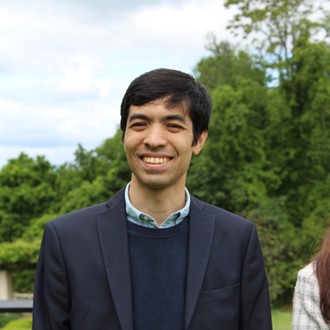 Giuliano Toshiro Yajima is a research scholar working in the State of the US and World Economies program. He is a member of the Levy Institute’s Macro-Modeling Team and a coauthor of its Strategic Analysis reports. He works on the Institute’s stock-flow consistent macroeconomic models for the US and for Greece.
Giuliano Toshiro Yajima is a research scholar working in the State of the US and World Economies program. He is a member of the Levy Institute’s Macro-Modeling Team and a coauthor of its Strategic Analysis reports. He works on the Institute’s stock-flow consistent macroeconomic models for the US and for Greece.
His academic research focuses on macroeconomic theory and policy, growth and income distribution, structural change and patterns of innovation, international financial instability, and ecological economics. Publications in scientific journals include, among others, Metroeconomica, Review of Political Economy (ROPE), Industrial and Corporate Change (ICC)and Review of Keynesian Economics (ROKE). He has also coauthored several working papers for the Levy Institute series.
He holds a PhD in Economics and Finance from La Sapienza University of Rome and a BA and MSc degree from the same university.
RECENT INSTITUTE PUBLICATIONS
POLICY NOTE 2025/4 | L. Randall Wray
Ratings Agencies Downgrade the Dollar’s Exorbitant Privilege
RESEARCH PROJECT REPORT | Ajit Zacharias, Fernando Rios-Avila, Nancy Folbre, and Thomas Masterson
Investing in Early Childhood Education and Care Services in Jordan
POLICY NOTE 2025/3 | Mark Silverman and Yeva Nersisyan
What Do We Save When We DOGE the Government?
ONE-PAGER NO. 73 | Dimitri B. Papadimitriou, Giuliano Toshiro Yajima, and Gennaro Zezza
The Incoming Recession: Are Imports the Real Culprit?
POLICY NOTE 2025/2| Pavlina R. Tcherneva
Remembering Pope Francis’s Call for a Universal Basic Wage
WORKING PAPER NO. 1081 | Günseli Berik and Ebru Kongar
The Rise and Rise of Feminist Macroeconomics: Who’s Recognizing?
POLICY NOTE 2025/1 | Dimitri B. Papadimitriou, Giuliano Toshiro Yajima, and Gennaro Zezza
Trump’s Tariffs: Ending Globalization
PUBLIC POLICY BRIEF NO. 158 | Pavlina R. Tcherneva and L. Randall Wray
That “Vision Thing”: Formulating a Winning Policy Agenda
WORKING PAPER NO. 1076 | L. Randall Wray
The Rise of the Modern Monetary System: An Integration of the Credit and State Money Approaches
WORKING PAPER NO. 1073 | Robert Skidelsky
Frankenstein in Fact and Fiction
STRATEGIC ANALYSIS |Dimitri B. Papadimitriou, Giuliano Toshiro Yajima, and Gennaro Zezza
U.S. Economic Outlook: Prospects for 2024 and Beyond
POLICY NOTE 2024/3 | Pavlina R. Tcherneva
Trump Wins While Americans Vote for Progressive Policies
Accommodations
A discounted rate ($129 per night) for conference guests has been arranged with the Holiday Inn Express & Suites Kingston/Ulster, a 15-minute drive from the Bard College campus.
Those wishing to reserve at the Holiday Inn Express & Suites Kingston/Ulster may call the hotel directly at (845) 336-6200 to give your arrival date and the group code of LIB (you may ask for the Levy Institute Bard College group). Alternatively, you may click on the Holiday Inn Express website and input the dates of arrival/departure and in rate preferences select group rate and use code LIB . *N.B.: guests have until 05/25 to reserve in the room block*
The Holiday Inn Express & Suites is located at 1835 Ulster Ave, Lake Katrine, NY 12449.
The hotel serves breakfast, which begins at 6:30am.
Shuttle Service
There will be a shuttle bus picking up conference attendees from the Holiday Inn Express & Suites on Monday, June 16 at 8:00am.
There will be two shuttle times to return to the hotel: at 6:30 pm, and 8:00 pm (pickup location: Blithewood/Levy Institute).
Travelling to the Levy Institute/Bard College
Aside from the above-mentioned shuttle, which transports guests from the Holiday Inn Express to Bard College and back at the noted times, travel to the area is the responsibility of conference guests.
Here is some information to help you make your arrangements.
- New York City to Bard College:
- Take the Amtrak from Moynihan Hall, Penn Station (NYP) to Rhinecliff (RHI). Finally, take a taxi (see below) from Rhinecliff to your final destination.
- JFK arrivals:
- Use the AirTrain to the Jamaica Ave. station to connect to subway or Long Island Rail Road service to Penn Station. Alternatively, take a taxi or rideshare. Take the Amtrak from Moynihan Hall, Penn Station (NYP) to Rhinecliff (RHI). Finally, take a taxi (see below) from Rhinecliff to your final destination.
- Newark (EWR) arrivals:
- Take the Amtrak from EWR to Moynihan Hall, Penn Station. Alternatively take a taxi or rideshare. Then take the Amtrak from Moynihan Hall, Penn Station (NYP) to Rhinecliff (RHI). Finally, take a taxi (see below) from Rhinecliff to your final destination.
- Laguardia (LGA) arrivals:
- Take a rideshare or rideshare + subway to Moynihan Hall, Penn Station. Then take the Amtrak from Moynihan Hall, Penn Station (NYP) to Rhinecliff (RHI). Finally, take a taxi (see below) from Rhinecliff to your final destination.
- Taxi Service from Rhinecliff Station to Holiday Inn or Bard College
- Red Hook Taxi: +1 (845) 758-1478
- Red Hook/Rhinebeck Taxi, +1 845-876-2010
- Village Taxi, +1 845-757-2244
Cancellations
A full refund will be made if notice of cancellation is received by June 1st, 2025. No refund will be made after that date. In the event that the conference is cancelled, the Institute will refund the full conference fee but cannot be responsible for any other costs incurred. If you wish to cancel your registration, please email [email protected].



